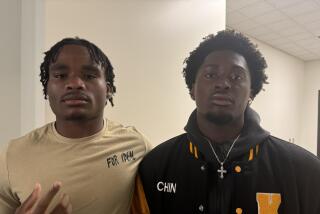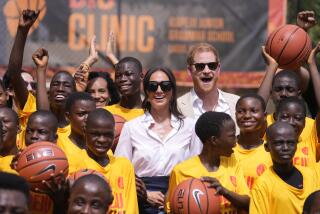Quick on Their Feet : Ezinwa Twins Continue Nigerian Sprinting Tradition
Like almost all young Nigerian boys, Davidson Ezinwa and his twin, Osmond, loved to play soccer. They were good at it. So good, in fact, that their parents couldn’t help but notice their sons’ growing talents.
Like most middle-class Nigerian parents, though, the Ezinwas believed sports to be a reasonable pursuit, but not for their children. To them, being an athlete was synonymous with dropping out of school, getting into trouble and losing respect for your elders.
Even as their sons came home with trophies and ribbons won in soccer games and school foot races, their parents held fast against sports.
“What about your schooling?” they would say.
Then one day, Davidson and Osmond were invited to compete in a national sports festival. It was 1987 and they were not track athletes, but they ran anyway.
They beat everyone else.
Again, they went to their parents.
“We have been asked by the Nigerian national coach to train seriously,” they said. “We can train here, at the University of Nigeria (where their father worked as an administrator). We will study hard.”
Their parents finally relented, but made it clear they did not approve.
“They spanked our butts every day,” Osmond said recently, laughing at the memory. “They spanked us and made us cry. They did everything possible to discourage us. They didn’t buy us (running) shoes, but we ran anyway.
“After the 1988 Olympics, they began to support us in our running. But they still emphasized our studies. When we said that we could go to the States and run for a university, they said, ‘Yes, well who is going to pay for your school fees?’ When they found out the schooling would be paid for with a scholarship, they began to buy us shoes.”
The Ezinwas don’t have to buy their sons’ track shoes anymore. To the delight of both athletes and parents, the brothers have full scholarships at Azusa Pacific University, where they are excellent students.
They are doing well in sports, too. Davidson has run 9.91 seconds in the 100 meters, the fastest time in the world this year and the third-fastest in history. Osmond has run 10.09.
In this, they are merely perpetuating a Nigerian tradition of excellence in sprinting. In fact, Nigerian sprinters in American colleges are excelling all over.
Consider this two-week span in early April: Osmond Ezinwa ran a 10.09. The same week, Odalpe Adeniken, a senior at Texas El Paso, ran 9.97, a Nigerian record. The next weekend, Davidson broke that record with his 9.91 in a meet at Azusa Pacific.
Although most casual track fans equate Africa with distance running, Nigeria stands out as a thriving enclave of spinter-jumpers.
There is a distinct athletic-geographic breakdown in Africa. East Africa--Ethiopia, Djibouti and Tanzania--has produced the world’s best marathon runners. North Africa--Morocco, Tunisia and Algeria--has produced some of the world’s best middle-distance runners. But sprinting speed belongs to the west Africans from Ghana, Ivory Coast and, especially now, Nigeria.
“We have a tradition and we are very proud of it,” said Innocent Egbunike, a Nigerian 400-meter runner who also attended Azusa Pacific. Egbunike was on the bronze-medal-winning 1,600-meter relay team at the Los Angeles Olympics.
“If you go to Nigeria, you could find great distance runners,” he said. “But the problem is that no one would want to run that distance. They want to be sprinters.”
Egbunike said the cultural differences in Africa may account for the skills in different disciplines. Rural east Africans run and walk great distances, he said, whereas urban west Africans develop speed in street games.
But the true secret of Nigeria’s success has been tradition--not just one superstar, but one after another.
The role models developed in the ‘70s, nurtured first by Nigerian sports officials eager to encourage international success, and then by American universities eager to offer scholarships in return for national titles.
Even Christian Okoye, one of the best-known Nigerian athletes as a running back for the Kansas City Chiefs, began his track and field career in Nigeria as a sprinter.
Lee Evans, Olympic gold medalist and former world record-holder at 400 meters, watched the development of Nigeria’s sprinters first-hand as he coached in the country from 1974 to 1981. Evans is now the national coach for Qatar, a Persian Gulf nation.
“Nigeria was like a coach’s paradise,” Evans said in a phone interview from Qatar’s training camp in La Grange, Ga. “I could always find fast kids. However, the best athletes, by far, were playing soccer. I had to raid quite a few soccer teams.”
Egbunike was trained by Evans, who said the greatest gift he gave Nigerian athletes was to convince them that they could break into the world-class ranks.
“When I first came to the States (in 1985) I felt a lot of confidence because I was coached by a world record-holder,” Egbunike said.
Egbunike, like the Ezinwas, was not encouraged by his family to attend school in the United States. The first wave of Nigerian athletes who came to the U.S. returned home with what one official politely called “bad habits.”
“We used to have a problem with our athletes coming back and misbehaving,” said Alex Onyenwenwa, secretary of the Nigerian Athletic Assn., in a phone interview from Lagos, Nigeria. “But now it’s not such a problem.”
Onyenwenwa suggested that one reason the Nigerian tradition is nurtured is Nigeria’s cultural emphasis on respect for elders.
“Here, we respect and obey our elders,” he said. “It’s part of our culture. It has had some effect on the field of play, on the track. You are taught to listen to your coaches.”
Azusa Pacific track Coach Kevin Reid agreed that the Nigerian athletes he has trained have been ideal.
“They just have a different attitude,” he said.
That attitude has been deployed at universities around the country. Sprinter Augustin Olobia of Washington State is ranked No. 3 in the Pacific 10 Conference. Ime Akpan of Arizona State is ranked No. 1 in the Pac-10 in the 100-meter hurdles. Christie Opara is enjoying success at Cal State LA.
These, and others at home, will probably make Nigerian sprinter-jumpers medal favorites at this summer’s Barcelona Olympics. Onyenwenwa hopes so.
“We are optimistic,” he said. “We do hope for a medal. We have fine athletes, no doubt about that.”
More to Read
Go beyond the scoreboard
Get the latest on L.A.'s teams in the daily Sports Report newsletter.
You may occasionally receive promotional content from the Los Angeles Times.







